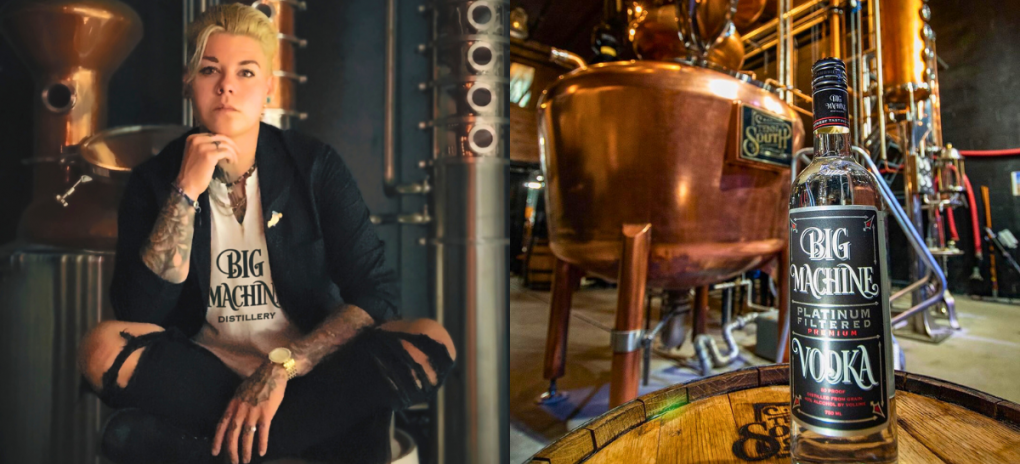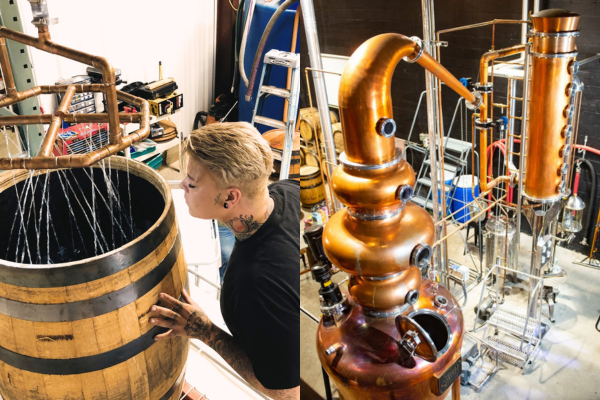
07/11/2023 From tattoo artist to Master Distiller, Devin's inspiring journey in the world of spirits. Discover her passion, challenges, and the evolving distilling landscape.
Discover the fascinating journey of Devin Walden, a Master Distiller with a unique path that began in the unexpected world of tattoo artistry and distillation. Her story is one of chance, passion, and determination, leading her to become a distillery genius. In her current role, Devin's responsibilities are as diverse as they are rewarding, aiming to enhance quality and efficiency. Delve into her insights, the craft of distilling, and the dynamic spirits industry.
Tell us a little about your background and journey into distilling.
I stumbled into this industry by chance. I knew nothing about the industry or how alcohol was made. I had never even visited a distillery. I was a tattoo artist by trade and bartending on the side. Looking to make some extra money I picked up a 3rd job as a temporary employee on the bottling line at Woodford Reserve. I didn’t know what to expect going in, but certainly would have never guessed I had just found my new passion. I worked hard, asked a lot of questions, got as involved as I could, learned as much as I could, and worked my way into the distillery as the first female distillery operator. Later in my career, I came across a new opportunity chose to take a chance, and accepted the position as Master Distiller of Tropical Distillers in Miami, Florida, a small startup distillery where I was able to expand my knowledge by learning much more about the business side as a whole. This experience was invaluable, however, I knew eventually my love for the art of whiskey would lead me back up north to Kentucky or Tennessee. An amazing opportunity in Tennessee opened up so I decided to go for it, and it has been the best decision I’ve made in my career so far.
Your current role and what does your day look like?
My current role as Master Distiller at the Big Machine entails many things. Every day is different and has its own set of challenges, yet is always rewarding. Some days I may be on the floor cooking a mash, checking in on a fermentation, or running the still, other days I may be working with our team on production schedules and goals. My focus every day however is the same, helping to improve quality, decrease waste, streamline processes, and ensure all production operations are as efficient and successful as possible.
What inspired you to become a distiller?
Originally I had no aspirations to be a distiller til I started working at a distillery. Once I stepped into the bottling house & the barrel houses, I obtained a true love and appreciation for the craft. But once I stepped foot in the actual distillery, smelling the mash, seeing the spirit pouring out of the spirit safe, watching barrels roll across the barrel run on their way to age, I became fascinated with wanting to be a part of that process. I knew then I wanted to learn more about how it is made and where it all starts.
What are some of the most important skills for a distiller?
I think the senses are a huge skill set that every distiller must be able to fully utilize. Sight, hearing, smell, touch, taste. Distilling is a hands-on job that requires all 5. Outside of this, persistence and the ability to shift when necessary, problems arise often, but so do opportunities. It is imperative to be able to think and act quickly.
How do you think a distiller can help in driving marketing and sales personally?
I think a distiller can help in driving marketing and sales because consumers now more than ever are interested in what makes your product different from everyone else, why is it unique? What makes it stand out? I think a distiller can help drive these two aspects of the business by also serving as an ambassador for the brand, aiding in consumer education.

Image Source: Devin Walden & Big Machine
Define a good distiller.
I believe a good distiller is willing to take risks, but calculated risks. Be creative and innovative, while also being analytical and realistic. I think a good distiller understands all facets of the business and takes all of them into consideration when making decisions. A good distiller is involved and engaged. And lastly, someone who understands the importance and value of the team as a whole. Our jobs are not possible without the support of the rest of the team, this includes production staff, marketing, sales, and leadership.
What is the hardest part of a distiller's job?
To me, the hardest part of a distiller job is oftentimes quick decisions need to be made and there may not be many people you can bounce ideas off of at the time to find a solution. Sometimes some problems or hurdles arise that need an almost immediate instantaneous answer. Trusting your gut, your knowledge, and experience, and always keeping the best interest of the team/ business/ brand as a whole at the forefront of your mind helps when making these decisions.
What's your elevator pitch to a bartender when pitching your brand?
My elevator pitch to a bartender when pitching our brand is telling the story of our brand's foundation/ founders, the incredible talent of our team, and the small batch of craft spirits we make by hand every day. We have an amazing story to back our products unlike anything else on their back bar.
What do you look for in a supplier when sourcing bulk spirits / NGS if you do?
If bulk spirits are ever needed, ensuring that their quality standards align with ours is crucial. This includes doing extensive research on our end of how their product is made, what their processing practices are, storage practices, quality control, etc.
Take us through your process of blending.
Our blending process is led by leadership with a common goal in mind, to put out a consistently high-quality product. For whiskey, the barrels are each tasted individually to evaluate flavor profile & brand standards, then partnered with similar barrels to create the best blends.
How do you take care of production waste?
We strive to keep production waste to an absolute minimum. Starting with our stillage goes to local farmers to be used as cattle feed. Outside of distillation processes, we have very little to no waste which is all thanks to the attentiveness and diligence of our team including raw materials such as grains, glass, corks, labels, etc.
How do you create complexity in the fermentation stage?
Complexity in the fermentation stage can come from a variety of methods. This could include your initial mash bill, fermentation temperatures, fermentation duration, sweet vs sour mash, the yeast strain used, and ensuring no unexpected undesirable characteristics arrive by maintaining a sterile and clean environment for the yeast.
What steps do you take to become more sustainable?
We make sure that anything that can be reused and recycled can do so. We always strive to be mindful of the suppliers we work with, the materials we use, ingredients, at all of our locations.
If you had to give a quick elevator pitch on why an account should bring in your product for its consumers, what would it be?
My quick elevator pitch would be outlining the sheer diversity and uniqueness of our products versus any other brand. From our small-batch craft spirits to our platinum-filtered vodka and our RTD vodka juice pouches, we truly offer something special for every consumer.
How do you explore new markets for your spirits and focus on business development?
Our leadership, sales, and marketing team do an outstanding job at analyzing industry trends, consumer trends, and consumer feedback, and staying involved and engaged through events, product tastings, etc. Our 3 tasting rooms having a setup and audience unique to each other also helps us gauge where consumers' interests lie.
What are the current challenges the spirits industry is facing according to you?
Current challenges the spirits industry is facing in my opinion include direct-to-consumer, supply chain issues with supplies, raw materials, etc, and finding ways to stand out amongst the heavy hitters in the industry especially as new brands enter every day.
What trends do you anticipate in the beverage industry in the coming months? Where do you see the domestic craft distilling scene going? What's next for the industry?
I see RTDs continuing to grow in popularity and availability. I’ve seen more and more recently being sold in groceries and gas stations. With even more contract distilleries breaking ground this year, I’d anticipate the amount of contract distilling increasing of course, but the smaller craft distilleries still have a light shed on them as well.
What skill or topic are you learning currently and why?
Topics I have been focusing on heavily for the past several months are mash bills, fermentation variables, barrel aging and finishing, and overall distillation practices to ensure we are getting the best yields possible during new projects.
What is your idea of a good life?
My idea of a good life is one built on love and community. Love what I do professionally, my hobbies, and my love for the people in my life. Building community with my family, friends, and work team. With those two things in mind, it is impossible to not live a fulfilling life.
Which is your go-to drink and what is the perfect setting you enjoy it in?
My go-to drink would likely be just a simple old-fashioned, enjoyed with great friends, great food, and a great atmosphere. Being surrounded by the mountains here in Tennessee is the perfect setting!
Your favorite 2-3 distilling or spirits books?
My favorite 3 distilling or spirits books would be “Bourbon Belles and Whiskey Women” by Karen Locke, “Whiskey Women: The Untold Story of How Women Saved Bourbon, Scotch, and Irish Whiskey” By Fred Minnick, and “Whiskey Distilled” by Heather Greene.
[[relatedPurchasesItems-31]]



